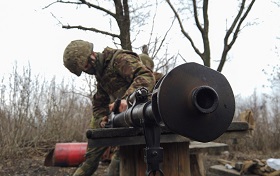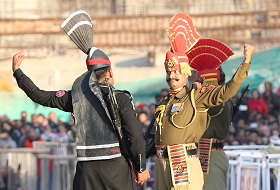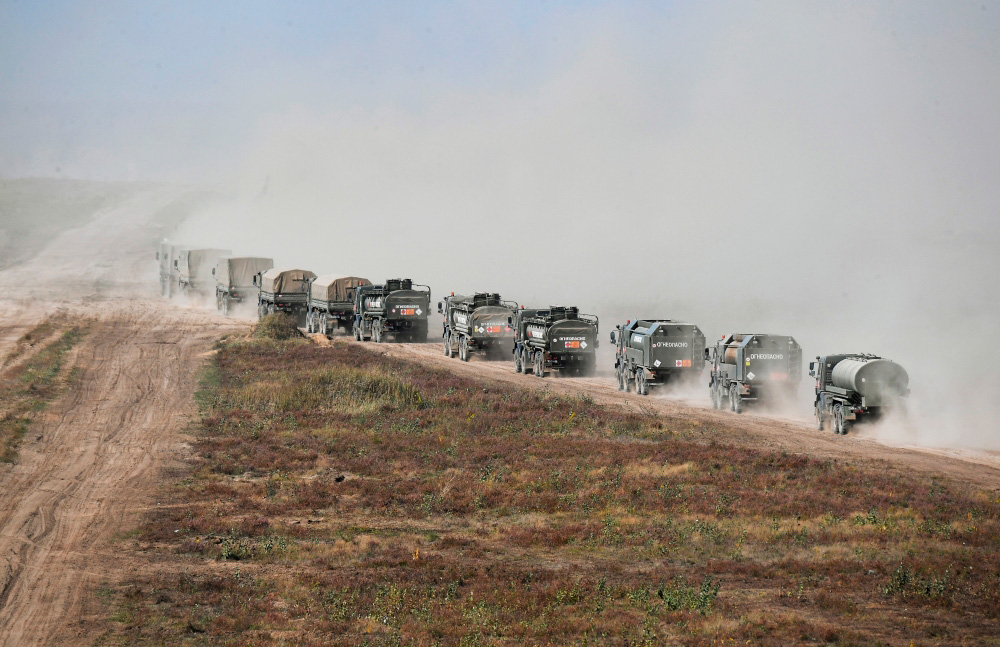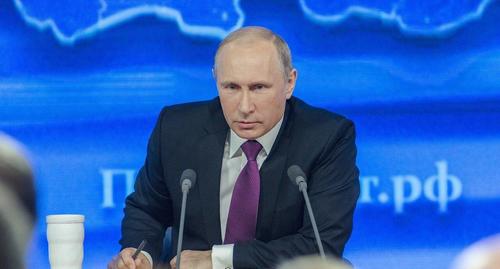coalcracker
Veteran Member
War Between Russia and Ukraine: A Basic Scenario?
Tom Wright
@thomaswright08
Very interesting piece from a Russian perspective on the Ukraine crisis. Concludes an invasion won’t happen but also, more intriguingly, spells out what might unfold if it did
Concern is growing in the Western media over Russian military activity in the southwestern theatre. There are opinions that Russia is preparing a military campaign against Ukraine. The supposed goal is to break the deadlock of the Minsk Agreements, to impose further coexistence conditions on Kiev and its Western partners, to prevent the US and NATO from “developing” the territory of Ukraine for military purposes, and also to reformat the country’s political system and its state structure. Such rumours are spreading quickly, causing alarm among the political leaders of foreign countries as well as latent, albeit tangible fears in the business community. However, it is still premature to consider such a development as a baseline scenario.

Ivan Timofeev:
A Grey Swan: Is There a New Conflict in Donbass?
Several circumstances speak in favour of the military scenario outlined by foreign commentators. The first is the recent experience of the Russian armed forces and the political consequences of their use. Moscow intervened in Georgia’s conflict with Abkhazia and South Ossetia in 2008, quickly changing the situation and recognising the two autonomies as independent states. In 2014, Russia carried out a lightning-fast operation in Crimea, creating conditions for the subsequent referendum on reunification. Later, the Ukrainian army was defeated in Donbass, and the political consequence was the formation of the LPR and DPR. In 2015, Moscow radically changed the military situation in Syria by deploying a compact but highly effective air group. The political result has been the preservation of power in the hands of the Assad government and the defeat of a number of terrorist groups. All these events indicate that Russia is ready to use force suddenly, in a concentrated manner and at the same time to seek concrete political changes.
The second circumstance is that the international political consequences for Russia which resulted from the military campaigns were relatively insufficient. No foreign state has intervened openly in these conflicts. Foreign military aid does not radically alter the balance of power. Economic sanctions in their current form harm the Russian economy, but they are still not the main factor contributing to existing problems. The economy itself is stable. In short, there are no major checks and balances on a new military campaign.
The third circumstance is that Russia is not ready to bear with the existing status quo in relations with Ukraine. Kiev is almost openly talking about sabotaging the Minsk agreements, and is not ready to implement them. The US and the EU cannot or do not want to change this; while at the same time they are verbally calling on Russia to abide by the agreements. Ukraine itself, after 2014, for obvious reasons, has been pursuing an anti-Russian line. The events of 2014 significantly strengthened the position of the nationalists. Any attempt to pursue a political dialogue with Russia is deemed unacceptable. A “mopping-up” of politicians who are in any way loyal to Russia is under way. Militarily weak and fearful of further complications with Moscow, Ukraine is seeking to deepen its defence ties with the United States and its allies, as well as trying to expand military aid and supplies. In Moscow, this is perceived as the “utilisation” of the territory of Ukraine by Western countries and is accompanied with subsequent threats to the strategic interests of Russia. Moscow considers the emergence of Western military infrastructure in Ukraine only a matter of time.
Taking into account these circumstances, a scenario where Russia takes action can be hypothetically considered in the West and in Ukraine in the following vein. With a sudden and decisive blow in several directions at once, Russian troops dismember the armed forces of Ukraine in the East of the country, surround separate groups, or press them against the Dnieper river. The actions of tank and motorised units are accompanied by powerful air, missile and artillery strikes. The Russian Aerospace Forces seize air supremacy. The apotheosis of the operation should be the encirclement and the subsequent capture of Kiev, and the stabilisation of the front line along the Dnieper. The creation of a new Ukrainian state with the capital in Kiev would be announced and recognised by Russia. It would include the previously-independent DPR and LPR. Russia thereby resolves several historical problems at once. The immediate threat to the southwestern borders is removed. Full control over the Sea of Azov and a land corridor to the Republic of Crimea are ensured. Two Ukrainian states appear on the map, one of which should be “friendly and fraternal”.
Even if one fails to write off this scenario as a reflection of existing phobias and nationalist complexes, it still seems unlikely for a number of reasons.
First, such a military conflict is unlikely to culminate in any intelligible agreement. A victory over the armed forces of Ukraine will not by itself lead to a fast peace. The war could develop into a long and sluggish confrontation, especially if part of the territory (for example, Western Ukraine) remains under the control of the Ukrainian armed forces. Capturing the whole of Ukraine is technically possible. However, it will be more costly, and subsequent control would be much more difficult. The option of “two Ukrainian states” would allow Russia to squeeze nationalists out by sending them West. Under a “one Ukraine” scenario, this would be impossible, given all the ensuing consequences.

Andrey Kortunov:
Nobody Wants a War in Donbass
Second, the conflict would inevitably lead to a sharp change in the Western approach toward providing Ukraine with modern weapons and military equipment. In the United States and in the West as a whole, the new situation would be considered as an emergency and they would not limit funds to support the armed forces of Ukraine. Moreover, in this case, all possible types of conventional weapons will be supplied. Large-scale military aid from the West would prolong the conflict. Russia would not be able to block such supplies. The United States and its allies will not enter open military confrontation with Moscow. However, the level of support for the Ukrainian army will grow significantly.
Third, regarding the Ukrainian issue, Russia would find itself in diplomatic isolation. It is unlikely that any country would voice support for Moscow’s actions. Unlike Crimea and Donbass, we’re talking about a large-scale and open clash between the armed forces, that is, about a full-fledged war. Russia would certainly be on the offensive. This would allow its actions to be classified as aggression without any problems. While the situation in Crimea and Donbass arose against the backdrop of revolutionary events in Ukraine and could be construed as part of a civil conflict, then in this scenario, such conditions are not visible. At the moment, there is no obvious conflict between the East and West of Ukraine. The legitimacy of Moscow’s actions in this case would be extremely weak, if not entirely impossible. In addition, Russia would have to bear responsibility for the civilian casualties, which would be inevitable in a large-scale conflict.
Fourth, all key Western players would introduce qualitatively new sanctions and restrictions against Russia. These would harm a number of Western countries and cause temporary shocks in world markets. But in an emergency situation, the West would take such measures, despite their economic cost. Possible measures include blocking sanctions against all Russian banks, including the Bank of Russia. This would largely cut Russia off from the global financial system. Another possible measure is a ban on the purchase of Russian oil, and then gas. Such bans can be increased gradually in order to avoid crisis situations with fuel supplies in the West itself. But in the event of a war in Ukraine, the West would take these measures. Other, more focused restrictions would be applied to imports and exports of oil and gas. The cumulative damage to the Russian economy would be colossal in scale.
Fifth, controlling Ukraine, even its eastern part, could be problematic. Taking into account the Western sanctions blockade, any transactions with the territories of Ukraine under Russian control would be impossible. Russia would have to take on a huge territory. The big question is whether the Russian market, in the grip of new sanctions, would be able to compensate for the damage to the Ukrainian territories under Russian control. The seizure of territories wouldn’t solve any of the problems facing the Russian economy today.
Sixth, the loyalty of the population of Eastern Ukraine to Russia is not obvious. Despite all the internal disagreements, over the past 30 years Ukraine has developed its own civic identity. The population of the eastern regions may have a negative attitude towards excessive nationalism. However, this does not guarantee their loyalty to Russia. Moreover, the war could finally undermine sympathy for Russia, which has already dwindled over the past six years.

Andrey Kortunov:
India — Pakistan and Russia — Ukraine: What if We Compare the Two?
Finally, seventh, the war is fraught with destabilisation of the situation inside Russia itself. There is no demand in society for a war with a neighbour, even despite the odiousness of the anti-Russia discourse in Ukraine. It is quite possible that Russian troops would be able to inflict resounding defeats on the armed forces of Ukraine and push them to the West. The losses, however, would still amount to hundreds, and possibly thousands of fighters. In the event of a possible prolongation of the conflict, human losses would become a permanent factor. Combined with a possible economic crisis, these are not the best conditions for generating public support. While reunification with Crimea was accepted with enthusiasm in Russian society for many reasons, a big war is unlikely to find such support.
In other words, the costs of a possible war far outweigh the benefits. The war is fraught with significant risks to the economy, political stability and Russian foreign policy. It fails to solve key security problems, while it creates many new ones.
The question arises—to whom and under what conditions is this scenario beneficial? First of all, it is attractive precisely as a hypothetical rather than a real situation. In this form, it makes it possible to consolidate Ukraine on an anti-Russian basis, to seek the expansion of Western military aid, and to justify such aid to the West. The threat of war and an exercise of power can also be used by the Russian side. Moscow shows that it is technically ready for a radical scenario and will not allow its “red lines” to be crossed. These “red lines” include a military solution to the Donbass problem. In other words, the scenario has a practical meaning as a tool for information warfare and political signals.
From the point of view of the balance of benefits and losses, neither side is interested in a real war. Therefore, it is hardly worth considering the war scenario as a likely one. However, history knows many examples when rational calculations have failed to put an end to escalation. There is only the hope that this isn’t the case here.
First published in the Valdai Discussion Club.

War Between Russia and Ukraine: A Basic Scenario?
Concern is growing in the Western media over Russian military activity in the southwestern theatre. There are opinions that Russia is preparing a military campaign against Ukraine. The supposed goal is to break the deadlock of the Minsk Agreements, to impose further coexistence conditions on...russiancouncil.ru
The guy sharing this, not the Russian who wrote it, but the American who is sharing it, is named Tom Wright, a senior fellow at the Brookings Institute. Here is part of his bio:
Wright has a doctorate from Georgetown University, a Master of Philosophy from Cambridge University, and a bachelor’s and master’s from University College Dublin. He has also held a pre-doctoral fellowship at Harvard University’s Belfer Center for Science and International Affairs and a post-doctoral fellowship at Princeton University. He was previously executive director of studies at the Chicago Council on Global Affairs and a lecturer at the University of Chicago’s Harris School for Public Policy.
I’m not sure if I should accept this at face value and just humbly submit to his obviously superior intellectual prowess, or if I should assume he is CFR (Council on Foreign Relations = an elite insider) and treat this as some kind of propaganda/programming for nefarious purposes.
At 4 AM here on the East Coast, I find myself wondering why the recent reporting on Ukraine reminds me of the early reporting on Covid 19. It seems like the elite may be chumming fish.
In other words, why all the sudden journalistic interest in drumming up war? It smells too mechanical, too “forced.” Almost like, a plan, you know, “Let’s write about it for a couple months before kicking it off.”
I don’t know. I’m just another Fellow at the Institute; no, not Brookings, Mental.

















